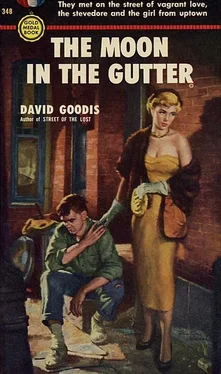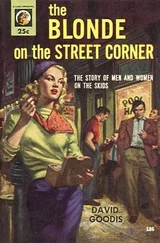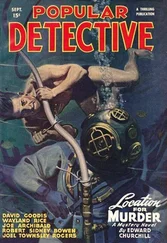And then, without seeing Mooney’s face, he was hit by something coming out of Mooney’s eyes. He looked at Mooney and knew the way it was, the way it must have been for a long time, and the way it would always be. The knowledge of it came to him very slowly, going into him very deep and pushing aside all the shock and astonishment, causing him to understand fully that Mooney had worshiped her and would go on worshiping her.
For some moments he stood looking at Mooney and they were having a silent conversation. They were talking about her, telling each other what a special item she’d been, and all the kindness and sweetness of her nature, the gentle manner and the sincerity. In the quiet of the room she gazed down at them and it seemed she joined them in their soundless discussion, saying, Don’t give me such a build-up, I didn’t really amount to much, just another Vernon girl with very little brains and no looks at all.
Mooney spoke aloud. “She was quality. The real quality.”
Suddenly Kerrigan felt very tired. He looked around for a place to sit. Finally he sat down on the mattress on the floor. He folded his hands around his bent knees and lowered his head and his eyes were half closed.
He heard Mooney saying, “She never knew how I felt about her. I’m not sure if I can tell it to you now.”
“I think I know already.”
“No, you don’t,” Mooney said. “She was your sister, and it’s an entirely different feeling. You never had to fight against something inside, something that said you were male and she was female. I wanted her so much that I used to steal from drugstores to poison myself so I’d get an upset stomach and have the cramps to think about.”
Kerrigan looked at him.
“Why didn’t you let her know?”
“I couldn’t. She’d have felt sorry for me. She might have done something that she didn’t want to do. Just to make things easier for me. It would have been an act of charity. You see, if I thought she went for me, I’d have asked her to marry me.”
“You should have told her.”
Mooney sighed slowly. He looked at the floor. He said, “She was clean. And I’m a dirty man. It’s the kind of dirt that don’t wash off. It’s in too deep. Too many memories of dirty places and dirty women.”
“You’re not so dirty. And I think you should have told her.”
“Well maybe I wasn’t man enough.” Mooney turned and looked up at the picture on the wall.
Kerrigan looked at Mooney and felt very sorry for him and couldn’t say anything.
“Not man enough,” Mooney said. “Just a specialist in the art of wasting time and lousing things up. There was a time the critics had me ranked with the important names in water color. They said I’d soon be pushing Marin for the number-one spot on the list. Today I’m pushing the sale of window signs for butcher stores and tailor shops. My weekly income, according to latest reports, is anywhere from twelve to fifteen dollars. If the Treasury Department is interested, the current bankroll is a dollar and sixty-seven cents.”
Mooney was telling it to the dead girl, speaking in a conversational tone, as though he thought she could actually hear what he was saying.
“Comes a time,” he told the painted face on the wall, “when the battery runs down, the stamina gives out, and a man just don’t care any more. That happened long ago with this fine citizen. Not a damn thing I could have done for you, except lean on your shoulder and weigh you down. I’m a great leaner, one of the finest. I have a remarkable talent for making people tired.”
Kerrigan figured it was time for him to say something. “You have a pretty fair talent for painting pictures.” He gazed at the portrait on the wall.
“Thank you,” Mooney said quietly and formally, as though he were addressing an art critic. Then his tone became technical. “There was no live model. This work was painted from memory. There were more than thirty preliminary sketches. The portrait took three months to complete, and this is the first time it’s been exhibited.”
Kerrigan nodded, although he was scarcely listening. He went on looking at the painted face that was framed there on the wall and gradually it became a living face as the gears of time shifted into reverse, taking him backward five years to a summer night when he stood with Catherine on the corner of Second and Vernon. He’d been walking up Second Street and he’d seen her leaning against the lamppost on the corner. Coming closer, he’d noticed that she was breathing heavily, as though she’d been running. He said, “What’s wrong?” and for some moments she didn’t answer, and then she smiled and shrugged and said, “It’s really nothing.” But he knew the smile was forced, and the shrug was an effort to hide something.
He put his hands on Catherine’s shoulders. He said quietly, “Come on, tell me.”
She tried to hold the smile, tried to shrug again. But somehow she couldn’t manage it. Her lips quivered. Her pale face became paler. All at once she gripped his arms, as though to keep herself from falling, and she said, “I’m so glad you’re here.”
“Catherine.” His voice was gentle. “Tell me what happened.”
She hesitated. Then, whatever the issue was, she made an attempt to evade it. She said, “You look so tired and worn out. Work hard today?”
“Overtime,” he replied. “They were short of men.” In the glow of the street lamp he saw the delicate line of her features, the fragility of her body. She always wore low-heeled shoes and loose-waisted schoolgirl dresses and looked much younger than eighteen. The dress was cotton, plain drab gray, and it needed sewing here and there. But it was clean. She wouldn’t wear anything that wasn’t clean.
She was smiling again and saying, “You really look knocked out. Let’s go somewhere and sit down.”
She was always saying, “Let’s go somewhere,” as if there were anywhere to go except the candy store, which had a small fountain and a few battered stools.
“Come on,” she said. “I’ll treat you to a soda.”
She took his hand. He sensed she was anxious to get off the corner. They walked two blocks to the little candy store and went in and sat down at the fountain. She asked him what he wanted and he said, “Orange,” and she put a dime on the counter and ordered two bottles of orange pop.
He took a few long gulps and his bottle was empty. She sipped hers from a straw. He watched her as she sat there taking tiny sips and enjoying the flavor of the soda. There was a look of pleasure on her face and he thought, It takes so little to please her.
Suddenly he got off the stool and went to the magazine rack. She liked movie magazines and he stood there checking them to see if there was one that she hadn’t read yet. He was reaching for a magazine when the door opened and three young men came into the candy store. They sort of barged in, and he turned and looked at them. They were wearing torn shirts and ragged trousers and battered shoes. It was hard to tell which one of them was the ugliest, which face was most misshapen.
The three of them were winking at each other as they moved toward Catherine. She was still sipping the soda and hadn’t yet seen them. Kerrigan was waiting to see what they’d do. He saw the shortest one, who looked like a middleweight, slide onto the seat next to Catherine. The middleweight grinned at her and said, “Well, whaddya know? We meet again.”
Catherine was trembling slightly. Kerrigan had a fairly adequate notion as to why she’d been out of breath when he’d met her on the corner.
The middleweight went on grinning at her. The other two were snickering. One of them was scar-faced and the other featured a yellowish complexion and crooked buck teeth that prevented him from closing his mouth. Scarface sat down so that Catherine was hemmed in between him and the middleweight. Then Scarface said something in low tones that Kerrigan couldn’t hear, and Catherine winced. She turned her head to see Kerrigan standing there at the magazine rack. He gave her a reassuring nod, as though to say, Don’t worry, I’m still here, I just want to see how far they’ll take it.
Читать дальше












